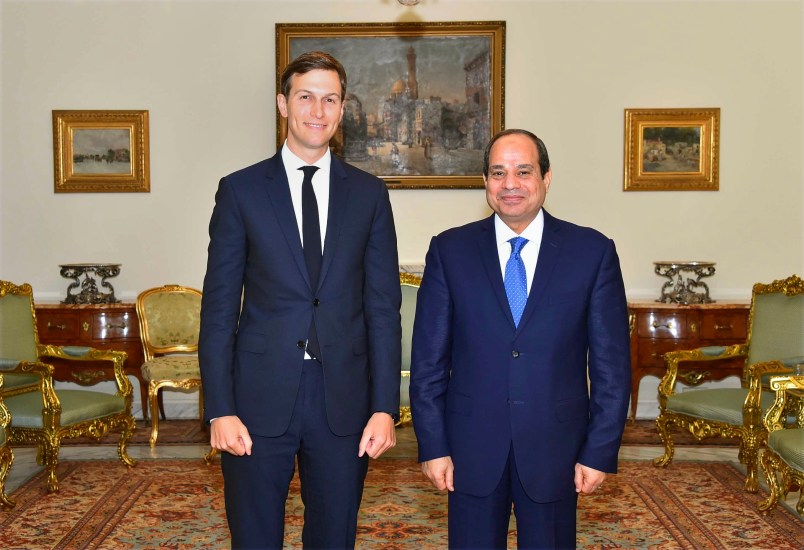CAIRO (AP) — Egypt’s president and foreign minister met with White House adviser Jared Kushner on Wednesday, just hours after the Trump administration cut or delayed hundreds of millions of dollars in aid to Cairo over human rights concerns.
Kushner, who is also President Donald Trump’s son-in-law, was in Cairo as part of a Middle East tour aimed at exploring ways to revive Israeli-Palestinian peace talks, which last collapsed in 2014.
A modified version of Foreign Minister Sameh Shoukry’s schedule had earlier showed the meeting with Kushner cancelled, which was widely seen as a snub in protest at the aid cuts. But Shoukry later sat in on Kushner’s meeting with President Abdel-Fattah el-Sissi and met with the American delegation separately at the Foreign Ministry.
Kushner’s delegation includes Jason Greenblatt, the U.S. envoy for international negotiations, and Dina Powell, the deputy national security adviser.
The Trump administration on Tuesday cut nearly $100 million in military and economic aid to Egypt and delayed almost $200 million more in military financing, citing Egypt’s poor human rights record and its crackdown on civic and other non-governmental groups.
The move came as a surprise to many, given the close ties forged since Trump took office. The U.S. president has repeatedly hailed el-Sissi as a key ally in the fight against terrorism.
In a statement, the Egyptian Foreign Ministry said Cairo regretted the U.S. decision, calling it a “misjudgment of the nature of the strategic relations that have bound the two countries for decades.”
It said the move “reflects the lack of careful understanding of the importance of supporting the stability and success of Egypt as well as the size and nature of the security and economic challenges faced by the Egyptian people.” The decision, it warned, may have “negative consequences for the realization of common U.S.-Egyptian interests.” It did not elaborate.
Egypt is among the top recipients of U.S. military and economic assistance, receiving about $1.5 billion annually. The $1.3 billion in military aid and $250 million in economic aid is linked to Egypt’s 1979 peace treaty with Israel, and underpins a U.S.-Egyptian security relationship that is now mostly aimed at fighting terrorism.
In recent years, Egypt has clamped down on civil society, particularly human rights groups and other organizations that receive foreign funding. Such groups played a central role in the 2011 uprising that toppled longtime autocrat Hosni Mubarak, and pro-government media often present them as part of a conspiracy to undermine the state.
The authorities have arrested thousands of people since el-Sissi led the 2013 military overthrow of President Mohammed Morsi, an Islamist who won the country’s first freely contested election.
Most of those in detention are Islamist supporters of Morsi, but a number of prominent liberal and secular activists have also been jailed.
Trump made no public mention of human rights when he warmly welcomed el-Sissi to the White House in April, an omission that many took as a sign that the issue was not a priority for the administration.
But two months later, two senators from Trump’s Republican Party slammed as “draconian” a new Egyptian law that effectively bans the work of non-governmental organizations and urged its repeal.
Egypt has defended the law, which provoked an international backlash, saying it was drafted and approved according to its constitution.
Egypt is grappling with an insurgency by Islamic militants in the northern part of the Sinai Peninsula, an ailing economy and a rapidly growing population of 93 million. The militants, led by a local affiliate of the extremist Islamic State group, have in recent months targeted Egypt’s large Christian minority, killing scores in a spate of attacks.
Kushner has meanwhile been trying to revive Middle East peace talks, which last collapsed in 2014. He has made little evident progress, and has yet to lay out a clear vision for what Trump has called the “ultimate deal.”
He and his delegation traveled to Jordan on Tuesday, where they met with King Abdullah II. They also visited Saudi Arabia and Qatar, according to local media reports.
On Thursday, the delegation is expected to hold separate meetings with Israeli Prime Minister Benjamin Netanyahu and Palestinian President Mahmoud Abbas, but no major breakthroughs are expected.
Trump has yet to fully endorse a two-state solution, which has been at the heart of U.S. policy for nearly two decades. He has said it’s up to Israel and the Palestinians to decide the shape of a final settlement.







Surprise, we don’t have an Ambassador to Egypt.
I thought the Nasturtium Narcissist said in his speech in Saudi Arabia that the US isn’t going to tell other nations how to live anymore. And human rights abuses in Saudi Arabia don’t seem to be problematic for #45.
Yeah, I would really like to know what Jared the Slumlord has done so far to bring peace to the Muddled East. Not to mention what he thinks that “peace” is going to look like.
This is a perfect example of “watch what the administration does, not what Trump says.” Trump is always going to a$$ki$$ “strongmen” dictators because that’s who he wants to be and admires.
But then, he’s going to back stab anyone or country when it’s useful or benefits him, because that is always what he’s done in business. And he’s a spineless bastard who doesn’t know how to use his words and only speaks out of his a$$.
Peace is at hand!
Why do we have a State Department & Secretary of State?